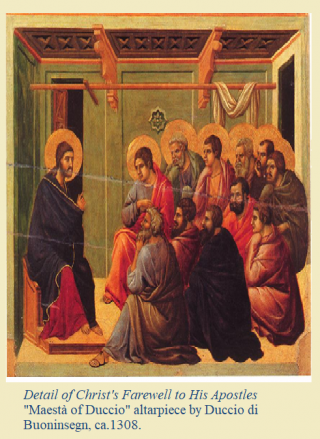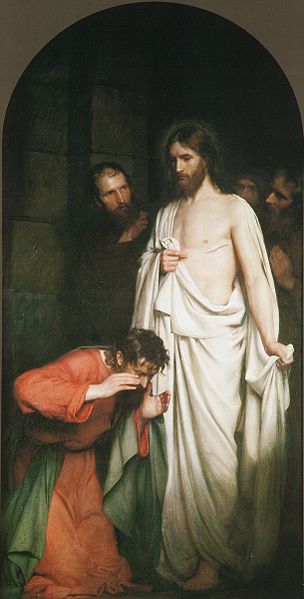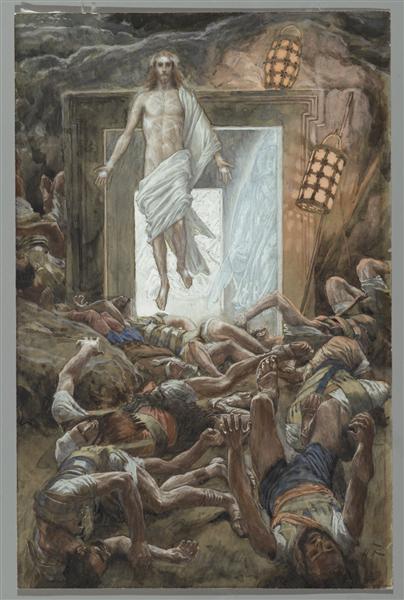John 16:16-23
Pastor James Preus
Trinity Lutheran Church
April 25, 2021
Seven times in our Gospel lesson we hear our Lord say, “A little while.” Seven is a holy number. It symbolizes God’s providence and loving care. Three is the number of God, who is three persons, yet one God. Four is the number of the earth. In six days, God created the heavens and the earth and on the seventh day he rested. Yet, God continues to watch over and care for his creation. By repeating the words “a little while” seven times in this Scripture passage, the Holy Spirit is communicating to us that throughout this little while of suffering our loving God is in control.
Jesus speaks these words to his disciples on the night in which he was betrayed. This Gospel lesson teaches us about three little whiles. The first is the one, which will follow immediately when Jesus is arrested and crucified and laid dead in a tomb. During this little while the disciples wept and lamented while the chief priests and Pharisees rejoiced. Yet, this little while ended when Jesus rose from the dead and showed himself to his disciples. The second little while came when Jesus ascended into heaven forty days after his resurrection. Soon afterward, his disciples experienced severe persecution as they proclaimed the Gospel that Jesus died for the sins of the whole world, rose from the dead, and is now seated at God the Father’s right hand. That little while ended when the Apostles were each granted a Christian death and were received by their Lord Jesus in paradise where they sit on twelve thrones (Matthew 19:28; Luke 22:30). The final little while is the little while we currently are suffering in. It is the little while of the Holy Christian Church on earth in these last days. This little while will end for each of us personally when we die and are received into paradise and generally for the entire Church on earth when Christ returns to judge the living and the dead, and his Church will rejoice with her Head for all eternity.
Each of these little whiles has a cross. In the first is the literal cross of Christ Jesus onto which he was nailed by his hands and feet and languished in unspeakable pain while bearing the guilt of all mankind on his very soul. This is the most important cross, which Jesus for a little while bore. Yet, our Lord willingly embraced this cross for our sake, desiring our salvation. He knew that we could not pay for our sins without bearing them for eternity in hell. So, Jesus bore our sins on the cross for us. And although Jesus cried, “My God, my God, why have you forsaken me?” from the cross, he remembered the rest of that Scripture which he quoted also declared, “I will tell of your name to my brothers;
in the midst of the congregation, I will praise you,” (Psalm 22:22) which means that after he had suffered for a little while, the Father would raise him up to comfort his Church with the promise of everlasting life. In Jesus’ little while of suffering on the cross, God remained in control. This was his plan to win for us salvation. Jesus trusted his Father in the midst of his suffering.
The second cross is the one borne metaphorically and also at times quite literally by the apostles as they suffered shame for the cross of Christ. They were beaten, imprisoned, betrayed, slandered, and even crucified for the Gospel of Christ. Yet, encouraged by Jesus’ words and strengthened by the Holy Spirit whom Jesus sent to them, they endured. They considered it an honor to suffer dishonor for the name of Jesus. They knew that when they finished the race Christ had an imperishable crown stored up for them in heaven.
The third cross is the one we bear as Christians on this earth. Jesus told his disciples, “If anyone would come after me, let him deny himself and take up his cross and follow me.” (Matthew 16:24) Jesus says quite plainly that Christians should expect to suffer on this earth. We are called to be willing to lose all things for the sake of gaining Christ. This is the little while Jesus warns us about and for which he provides the greatest comfort.
Jesus offers comfort in the face of suffering. The first and most obvious comfort is the fact that he calls it a little while. The Greek word used is where we get the word micro. It’s so small. It won’t last. It will be over soon. Yet, the joy that will come will last forever. Jesus says that no one will be able to take that joy away. That alone gives comfort as we deal with suffering. That chronic pain that has become “normal” to you will come to an end. You will enjoy a happy reunion with your Christian loved ones who have preceded you in death. The temptations that try you and the sins that grieve you will be forgotten forever. Your own death is only temporary. Alleluia! This is but one reason why St. Paul says that the sufferings of this present age are not worth comparing to the glory that is to be revealed to us. (Romans 8:18)
Suffering can be defined as having evil inflicted against you. There are three types of Christian suffering. For all three, Jesus offers immense comfort. The first is godly grief, which leads to repentance. This suffering is when the Lord disciplines us for doing wrong. There is no glory in suffering for doing wrong. And Christians should never glory in sin whether they suffer for it or not. Yet, Christians do sin. And sometimes God permits suffering as a result of sin. This is not like the suffering for the Gospel, which is a great honor and blessing to the Christian. Rather, this is a shameful thing. And yet, there is still comfort in it when it leads to repentance. Scripture says, “Godly grief produces a repentance that leads to salvation without regret.” (2 Corinthians 7:10). And again, Scripture says, “For the Lord disciplines the one he loves, and chastises every son whom he receives.” (Hebrews 12:6, Proverbs 3:12)
And so, Christians count it a blessing when the Lord corrects them. As the Psalmist says, “Let a righteous man strike me—it is a kindness; let him rebuke me—it is oil for my head.” (Psalm 141:5) How much more when the Lord disciplines us! On this earth we have a chance to repent and turn to Christ. By disciplining us now, our Lord spares us from eternal hell. So, we find that even when we are disciplined now, it is a kindness from the Lord to turn us back to him.
The second type of Christian suffering is suffering as the result of living in a fallen world where sin and death reign. Here Christians are particularly comforted, because we know that Christ has taken away all our guilt and has won the battle against death. The wicked will not prevail. Death has lost its sting. We should not fear death. There is no sickness that can defeat us. What are cancer, stroke, heart-failure, Parkinsons, arthritis, and all the other awful maladies that plague us, but minions of death? But our Lord Jesus Christ has defeated death. So, how can the minions, these mere servants of death conquer us, when our Lord has vanquished their master and given us the victory? This is what we mean when we cry, “Oh death, where is your victory? O death, where is your sting?” Christ has taken away the sting of death by washing our sins away.
So, we are comforted in the suffering of our bodies and in the turmoil of the earth, because we know that this is only temporary and Christ has already won the victory for us. Yet, more than that we see our suffering as an opportunity to shed our old Adam, who must be drowned and die every day. We repent of our sins, knowing that the new man who rises will live forever. We cast away our idols, whether they are pleasures of life, good health, or long life, knowing that in Christ Jesus, even if we die, we will live forever. And our loved ones who die in the Lord will live forever as well. This does not mean that as Christians we should not mourn death. Jesus says that we will mourn now. We will weep now. But we do not mourn as those who have no hope. Rather, we maintain hope in our eternal joy even in the midst of sorrow.
The third and primary type of Christian suffering is the suffering on account of faith in Christ. This is the suffering Jesus is speaking of when he says, “You will weep and lament, but the world will rejoice.” And as with the other types of suffering, this suffering too will end after a little while. Then our sorrow will turn into a joy that will never be taken away from us. Yet, this third type of suffering also brings joy and comfort here and now.
Suffering has been described as crying out “No!” to God in complaint. And this makes sense as we look at the Psalms of lamentation in the Bible, such as Psalm 94, “O Lord, how long shall the wicked, how long shall the wicked exult?” (vs. 3) Of course, there is Psalm 22, which Jesus recited from the cross, “My God, my God, why have you forsaken me!”
And so, it seems strange that suffering could produce joy in the midst of suffering, even before the little while has passed. But listen to the words of our Lord Jesus, “Blessed are you when others revile you and persecute you and utter all kinds of evil against you falsely on my account. Rejoice and be glad, for your reward is great in heaven, for so they persecuted the prophets who were before you.” (Matthew 5:11-12) Jesus tells us to rejoice when we suffer on account of him, because it is a sign that we are his and that we will inherit the kingdom of heaven. This is why the apostles rejoiced when they were beaten for preaching about Jesus in the temple, because they had suffered dishonor for the name of Christ.
I do feel compassion for my fellow Christians, who suffer for confessing Christ: the Christians who are frequently murdered in the middle east for going to church, the pastor in Canada, who was imprisoned for holding church services, Christians who are maligned and slandered as haters by their family and acquaintances, because they still believe what the Bible teaches about sexual morality and the distinction between men and women. I have deep sympathy for the suffering of these Christians. Yet, I am much more concerned and fearful for those, who do not recognize the suffering of the Christian Church, who laugh along with the world while Christians are weeping and lamenting the evil inflicted upon them. I am fearful for them, because they are losing sight of Christ. One of the fruits of being a Christian is to suffer with Christ, because the world hated him first. This fruit, while bitter for a little while, is a comforting sign that you are in good company.
Our Lord Jesus endured suffering for our sake, so that he could pay for our sins. But also, to set us an example, so that we can learn to suffer in faith and find comfort in suffering. Romans 5 states, “More than that, we rejoice in our sufferings, knowing that suffering produces endurance, and endurance produces character, and character hope, and hope does not put us to shame, because God’s love has been poured into our hearts through the Holy Spirit who has been given to us.” (Rom. 5:3-5) When we recognize that we are suffering on account of Christ, we rejoice knowing that we will not be put to shame before God. And we learn that this suffering is a tool to shed the old Adam and gain endurance for the course before us. My fellow Christians, let us find such purpose in our suffering, so that we may gain endurance for this little while before our joy is made full. Amen.





 RSS Feed
RSS Feed